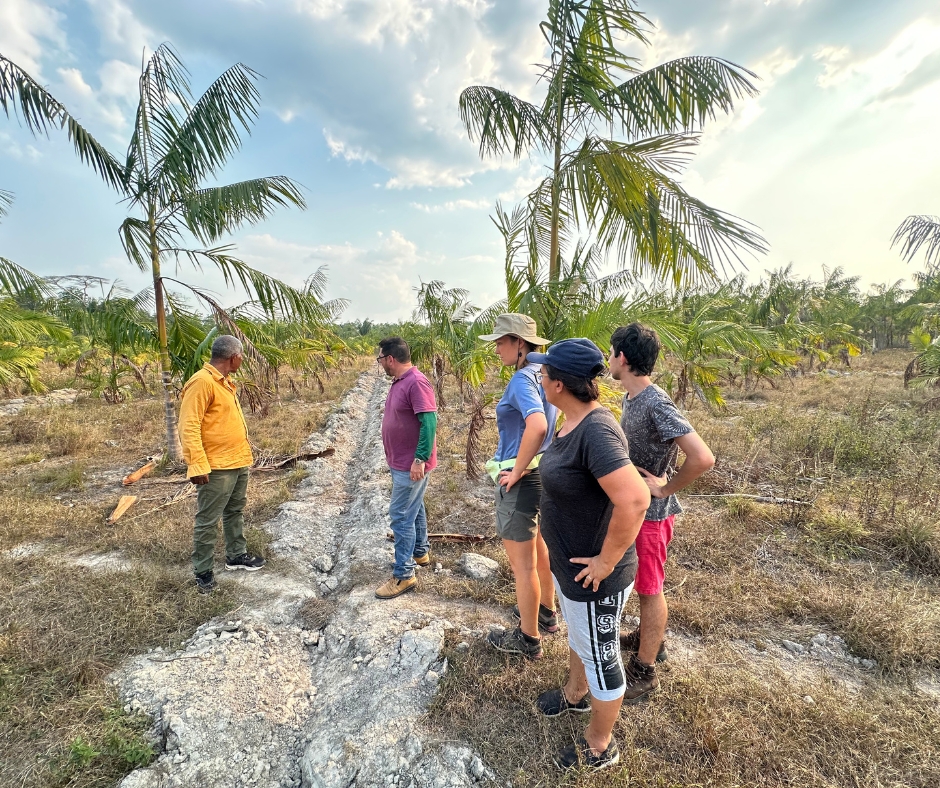Students of the International Cooperation in Agricultural and Rural Development (ICARD) bachelor programme at FTZ, Jan Müldner and Anna Pražáková, travelled to the Brazilian part of the Amazon as part of their final thesis. The topics of their theses are related to the long-term plan of the research team TRACE (Tropical Farming Systems & Ecological Economics) at the Faculty of Tropical AgriSciences, led by Assoc. Ing. Vladimír Verner, Ph.D., which is to strengthen food security and economic self-sufficiency of agricultural communities facing climate risks and to promote agrobiodiversity. Anička and Honza focused specifically on deforestation, sustainable farming and the use of local palm species. We are happy to share their experiences.
Research trip to the Amazon
The city of Manaus, where the students stayed during their research trip, is considered the gateway to the Amazon and is located on the north bank of the Rio Negro. An important stop on their trip was the MUSA (Museu da Amazônia) Museum of Amazonian Nature. MUSA is located on a 100-hectare area in the Adolpho Ducke Forest Reserve, which belongs to the Brazilian National Institute for Amazon Research (INPA). This unique site combines science, culture and biodiversity conservation, offering visitors the opportunity to see Amazonian flora and fauna in their natural habitat.
In the museum, students could see exhibitions focused on orchids, bromeliads, palms, ferns, snakes, spiders, butterflies, mushrooms and other representatives of Amazonian nature. One of the highlights was climbing a 42-metre tower to see the treetops and watch the sun rise over the Amazon.
Another part of the research trip led to the Federal University of Amazonia (UFAM), one of the most important universities in northern Brazil. The main campus in Manaus covers an area of 6.7 km2 and represents the largest section of urban forest in Brazil dedicated to academic purposes. The university focuses on research in the fields of tropical agriculture, ecology, botany and fisheries.
"Before one has the opportunity to leave the confines of a city of two million and move far enough away to begin to discover the origins of the forest's nature and get a glimpse into the traditional lives of the locals, one must first get used to the language, the cycle of the city, the climate, and learn as much as possible about the seemingly endless ancient forest directly from Manaus. After about two weeks, when our first (of three) trips further afield took place, we felt the plethora of life to be seen here, and a month-long visit to the Amazon suddenly felt like a snapshot of an outside observer. Despite this, however, we grasped the knowledge gained in Manaus and its science-rich institutions, and set out to visit individual farmers to determine their relationship to deforestation, or the sustainable use of local forest species," Honza Müldner described his experience.
"All this was only possible thanks to a year-long communication with a local family that was sympathetic to our research, and until we arrived in Manaus it was not at all certain whether the data collection would be successful and whether the local farmers would even be interested in talking to us. The Amazon was a massive logistical and organisational challenge, but our own desire and dedication, coupled with the possibility of this research taking place under the Faculty of Tropical Agriculture, made us want to make it happen," he added, explaining all that preceded their trip.
"From the arid savannah that has formed secondary growth after the rainforest was cleared, you get to the beginning of the adjacent pristine jungle. Through a gate made of mature trees, you enter the shady environment of the rainforest with a pleasant temperature and breathe in the fresh air full of the scents of exotic plants", Anna Pražáková explained the experience.
"Most of us are aware of deforestation in the Amazon, but few of us have ever had the chance to see it with our own eyes. This experience brought me a whole new understanding of this unique ecosystem, along with the realisation that it is imperative to continue to protect the most diverse place on Earth, as the consequences of its degradation will not only be borne by South America, but by the whole world. The experiences and ideas gained from my time in the Amazon Rainforest have given my bachelor's thesis more meaning than I could have initially imagined, and I believe they will continue to enrich my academic abilities," Anička highlighted the importance of the trip.
ICARD students have the opportunity to participate in international projects, travel to exotic destinations and gain practical experience in the field. At the same time, they can become part of research teams, such as TRACE, that address current global challenges in sustainable development. We are very excited to share their journeys with you and thank the students for sharing them with us.
ICARD: International Development in Practice
The ICARD Bachelor's programme is a three-year programme taught entirely in English. It is designed as a first, practically oriented undergraduate degree for future professionals in international technical assistance projects in rural and agricultural development. The course is designed to provide students with a wealth of knowledge and skills in project management, international communication and human resource management in a multicultural environment. The program includes internships in non-profit organizations, government institutions or private firms involved in international development projects.


